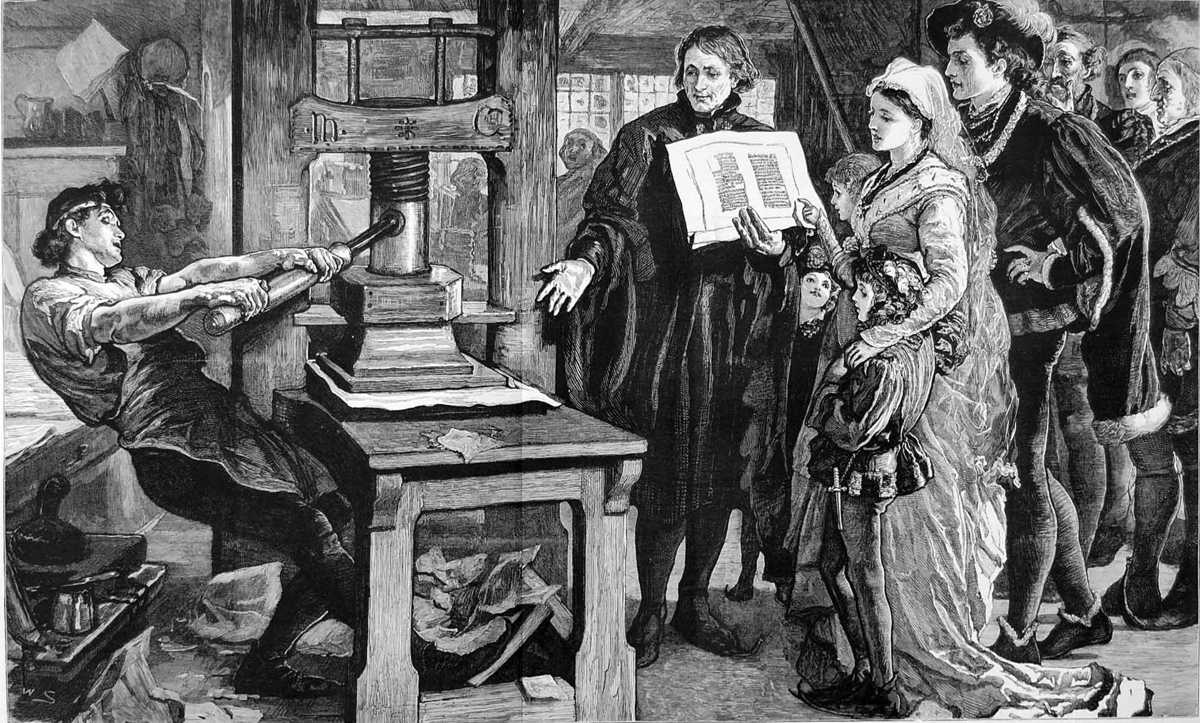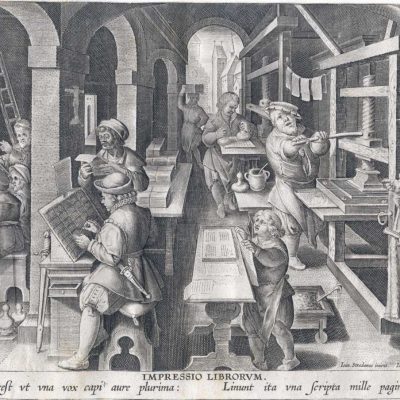 (Printer working an early Gutenberg letterpress from the 15th century. (1877 engraving))
(Printer working an early Gutenberg letterpress from the 15th century. (1877 engraving))
Publishing consists in presenting, reproducing, then legally marketing the intellectual production of an author. Publishing, in the broad sense, covers all forms of content production: literary, scientific, musical score, computer code, image, etc. The final medium is now multimedia, and no longer just paper.
More broadly, publishing can be understood as a mediation process that allows content to exist and be accessible.
Publishing would not exist without the invention of writing and printing. Before that, all the works were handwritten, copied by monks, while the printing press allowed the development of the distribution of texts and the development of the book.
Editorial functions and bodies
Benoit Epron and Marcello Vitali-Rosati identify three editorial functions:
- The function of choice and production (depending on quality and / or business requirements). From the selection of a text to its development and formatting, the publisher oversees the entire development of the manuscript and ensures that it follows the editorial line of the publishing house, fits into its aesthetic project. and / or be able to generate profits. It is also the publisher’s duty to ensure the material manufacture of the book. Publishing means above all “choosing and producing”.
- The function of legitimation (symbolic recognition). By choosing to publish an author’s text, the publisher, who is recognized in the literary world, gives his backing to the speech that appears therein. In doing so, it guarantees its quality and gives it a legitimacy that will be recognized by readers.
- The dissemination function (address, distribution and devices aimed at making content physically accessible and visible). The publisher acts as an intermediary between the reader and the author; he is the one who makes content visible in the public space. Therefore, it participates in the promotion of the aesthetic and / or ideological vision of the published work. It is also the role of the publisher to identify a readership for the book and to understand its needs and skills so that the content is addressed to him:; a content is edited when it is for someone.
The publisher’s work thus has a symbolic and economic dimension, which comes from the double status of the book as content and container. The publishers are those who manage to reconcile the man of letters and the entrepreneur, since they are responsible for approving the content of the manuscript, but also for ensuring that the conditions of production and distribution of the work are optimal, at a reasonable cost.
The person who does the editorial work and manages the collections is called an “editor”, not just the director of the publishing house. Editorial functions can of course be performed by different stakeholders within publishing houses, editorial bodies par excellence. An editor or a production manager can be an editorial body in the case of a newspaper or magazine article, for example.
Before the creation of publishing houses and their institutionalization in the 15th century, functions were assumed by patrons.
Expanding the field of publishing in the digital age
Since 1990, with the development of the Web, new editorial bodies have appeared, competing with publishing houses. The development of the Internet and the Web has also brought new models of legitimation by presenting new means of production, dissemination and distribution and adding to the symbolic recognition linked to print. These include community recommendations and algorithms.
In the digital age, the editorial function is associated with new forms of content production, which help to question the boundaries of publishing as an activity: blogs, wikis and social networks. These platforms produce, distribute and legitimize content, the editorial process is therefore no longer associated with traditional media.












Leave a Reply